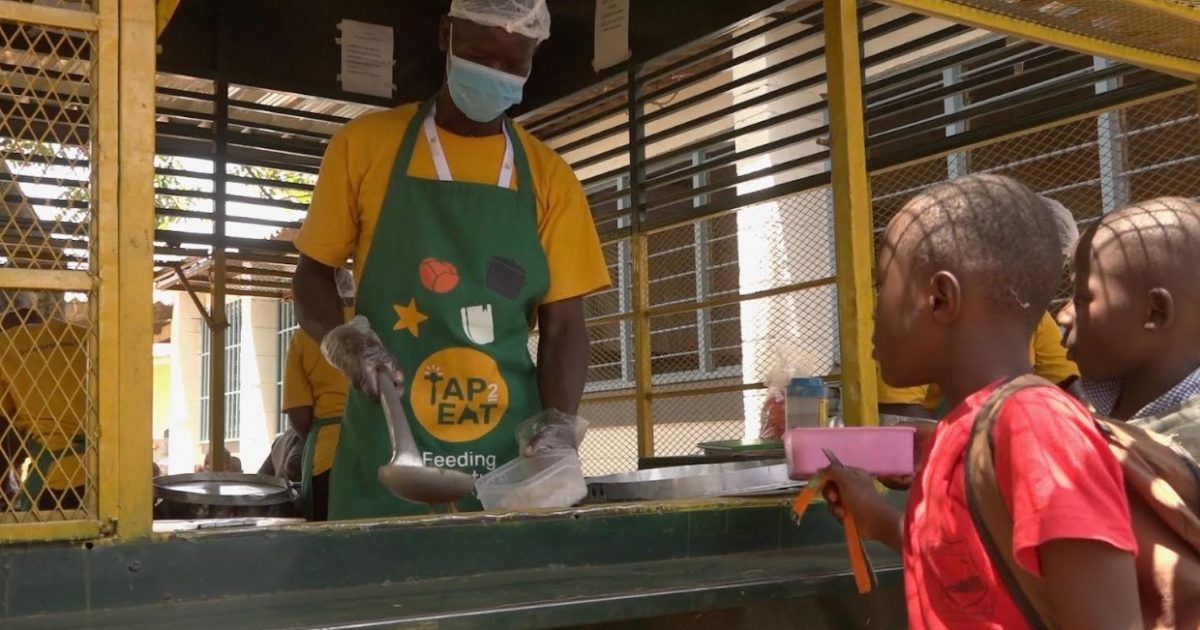Transforming Education in Kenya: How the Tap to Eat Initiative is Changing Lives

For Billdad Otieno, a pupil at Kosawo Comprehensive School in Manyatta informal settlement, a hot meal at school is more than just sustenance—it’s an opportunity to learn, grow, and dream of a brighter future.
Coming from a struggling household, Billdad often faced school days on an empty stomach, making it difficult to concentrate in class. Hunger gnawed at him, affecting his ability to learn. However, everything changed when he joined the Tap to Eat initiative, a digital school feeding program under Food for Education. Today, he receives a nutritious meal every school day, allowing him to stay focused and excel academically.
A Game-Changer for Education
Billdad is among 2,500 learners at Kosawo Comprehensive School benefiting from the digital feeding initiative, which has significantly transformed education not only at the school but across Kisumu County.
According to Deputy Headteacher Eric Odero, the program has led to a remarkable increase in enrollment, doubling the student population to 3,500, one of the highest in Kisumu County. He attributes this surge to the success of the feeding program, which has encouraged more parents to enroll their children, knowing they will receive a reliable, nutritious meal daily.
Before the program’s implementation, many students carried packed lunches, which they often consumed long before lunchtime, leading to poor concentration. Others walked home for lunch, returning late and missing vital afternoon lessons. The Tap to Eat initiative has solved these challenges, ensuring that students have enough time to eat, play, and return to class energized and ready to learn.
Boosting Academic Performance and Student Retention
The positive impact of the initiative extends beyond just addressing hunger. According to Odero, retention levels have significantly improved, and the school is now sending more students to top national secondary schools, where they compete effectively with their peers.
“With regular meals, students are more attentive and energetic,” he says. “We’ve seen notable improvements in academic performance, and many of our pupils have successfully transitioned to prestigious national schools.”
How the Tap to Eat System Works
The Tap to Eat initiative is an innovative digital school feeding program that allows parents to contribute Sh15 per meal using a Near Field Communication (NFC)-enabled smart wristband. This wristband is linked to a virtual wallet, where payments are made via mobile money. Students simply ‘tap’ their wristbands at meal distribution points to receive their food, ensuring efficiency and transparency.
For learners like Billdad, sponsorship opportunities ensure that even those from financially struggling families receive meals. According to Odero, many students from the Manyatta slums rely on well-wishers to cover their meal costs, making the program a vital lifeline.
A Community Embracing Change
Parents in the community have embraced the program, acknowledging the financial relief and educational benefits it provides. Wilkister Olang, a parent at the school, describes how the initiative has made feeding her three children more affordable:
“I only pay Sh45 per day for my three kids’ meals, totaling Sh225 per week. This is far cheaper than preparing food at home,” she says.
Benta Nyakie, another parent, praises the convenience, noting how the hot, nutritious meals allow parents to focus on other responsibilities without worrying about their children’s nutrition.
“I used to wake up early to cook for my son, but now I have peace of mind knowing he’ll eat at school,” she says.
Expanding the Impact: A Nationwide Initiative
According to Michael Njiru, Tap To Eat Programme Lead for Kisumu County, the initiative has rapidly expanded since its launch in July 2022. Currently, 24 schools in Kisumu County have adopted the program, providing 21,000 meals daily and significantly improving school retention rates.
Nationally, the Food for Education program now supports over 500,000 learners across 10 counties, with an ambitious goal of reaching one million students by 2027.
Aligning with Africa’s School Feeding Goals
The success of Kosawo Comprehensive School’s feeding program aligns with the 10th African Day of School Feeding, which is being commemorated in Bangui, Central African Republic. This year’s theme, “A Decade of Nourishment: Celebrating the Past, Securing a Just Future,” highlights the critical role of school feeding programs in promoting education, nutrition, and community development across the continent.
Conclusion
The Tap to Eat initiative is proving to be a game-changer for education in Kenya. By ensuring students receive nutritious meals daily, it is tackling hunger, improving academic performance, and boosting school enrollment. With continued support and expansion, this program has the potential to transform the future of millions of learners across the country.
With its innovative approach to school feeding, the Tap to Eat initiative is not only nourishing young minds but also laying the foundation for a brighter, more educated generation in Kenya.
